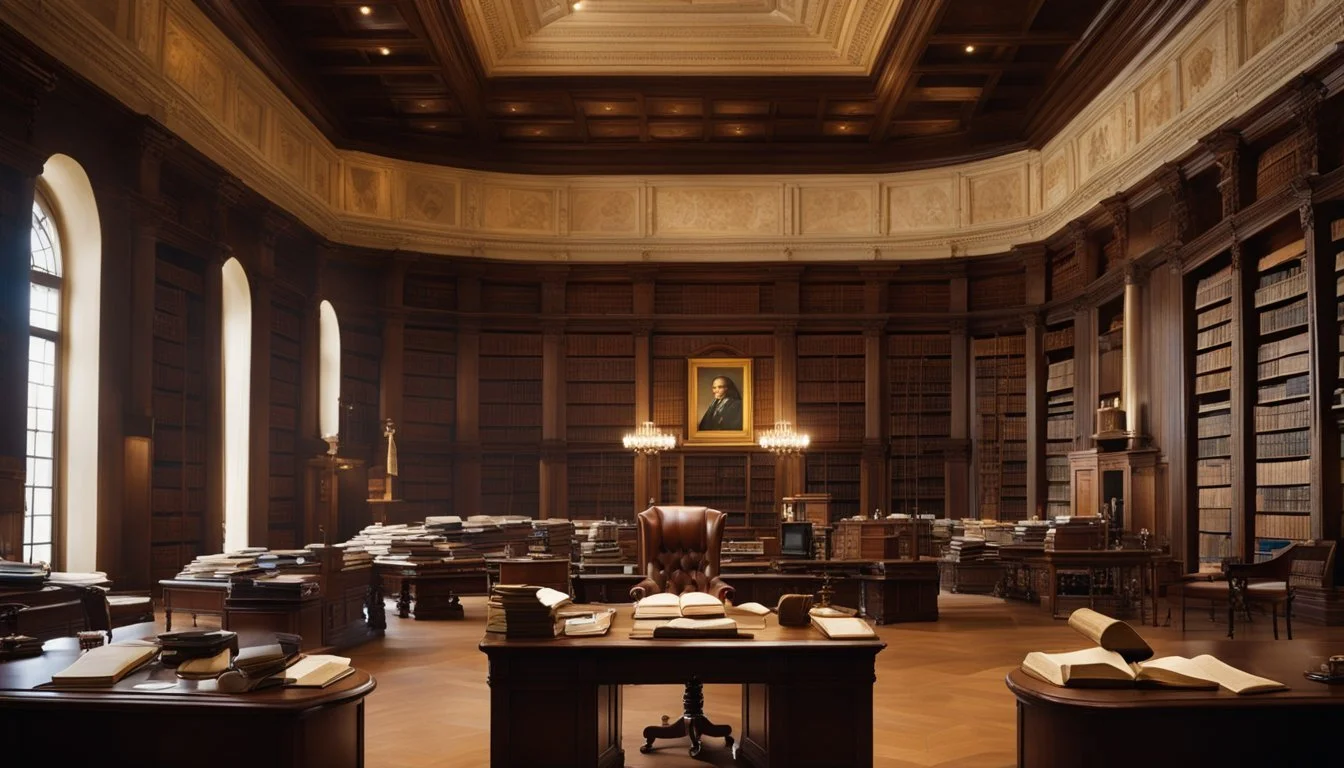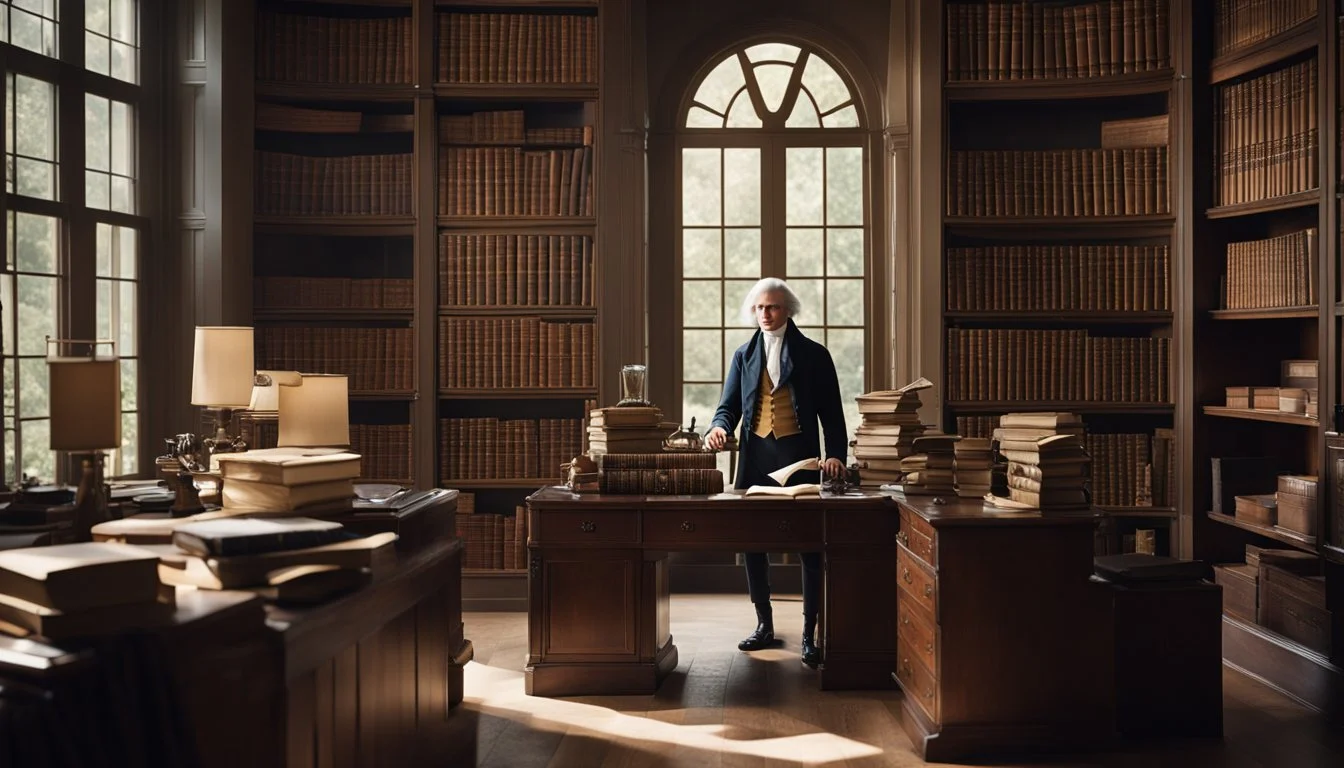7 Eye-Opening Documentaries About Thomas Jefferson's Complex Life
Exploring the Founding Father's Legacy
Thomas Jefferson stands as a pivotal figure in American history, revered as a Founding Father yet shrouded in controversy. His life and legacy have been the subject of numerous documentaries, each offering unique insights into the man behind the Declaration of Independence and the third U.S. presidency.
These documentaries provide viewers with a comprehensive look at Jefferson's multifaceted character, exploring his political achievements, personal contradictions, and lasting impact on American society. From his intellectual pursuits to his complex relationships, these films shed light on the various aspects of Jefferson's life that continue to fascinate historians and the public alike.
1) Jefferson's Blood (2000)
"Jefferson's Blood" is a thought-provoking documentary that explores the complex relationship between Thomas Jefferson and Sally Hemings. The film delves into the controversial claim that Jefferson fathered children with Hemings, an enslaved woman at Monticello.
This FRONTLINE production examines the historical evidence and genetic testing that supports the long-debated connection between Jefferson and Hemings. It presents interviews with historians, descendants, and experts who offer their perspectives on this contentious issue.
The documentary also addresses the broader implications of Jefferson's personal life on his legacy as a Founding Father. It raises questions about race, power, and the contradictions between Jefferson's ideals and his actions.
"Jefferson's Blood" provides a nuanced look at how this aspect of Jefferson's life has affected his descendants, both black and white. It explores the challenges faced by those who have sought recognition and acceptance as part of the Jefferson lineage.
More information on "Jefferson's Blood"
2) Thomas Jefferson: A View from the Mountain (2000)
This documentary explores the complex life and legacy of Thomas Jefferson. It examines his role as a founding father and author of the Declaration of Independence, while also addressing his ownership of slaves.
The film features insights from historians, politicians, and actors, including Danny Glover and Sissy Spacek. It delves into Jefferson's views on slavery and the rumors of his relationship with Sally Hemings.
Edward Herrmann narrates the two-hour documentary, which aims to present a balanced view of Jefferson's life. It highlights his intellectual pursuits, noting that as a young man he devoted up to 15 hours a day to study.
The documentary also covers Jefferson's inheritance of his family estate in Virginia at age 21. It explores the paradoxes in his life, contrasting his ideals of freedom with his refusal to free his own slaves.
More information on Thomas Jefferson: A View from the Mountain
3) Slavery and the Making of America (2005)
"Slavery and the Making of America" is a four-part documentary series that aired on PBS. The series explores the history of American slavery from its beginnings in the British colonies through the Reconstruction era.
Morgan Freeman narrates this comprehensive look at how slavery shaped the United States. The documentary highlights the experiences and contributions of enslaved individuals throughout American history.
One episode focuses on Thomas Jefferson's slave Jupiter and other notable African Americans like Colonel Tye and Elizabeth Freeman. It examines their responses to the increasingly restrictive system of slavery in America.
The series blends historical reenactments with expert commentary to provide a nuanced view of this complex topic. It challenges long-held notions about slavery's role in American society and economics.
"Slavery and the Making of America" emphasizes the development of a unique culture among enslaved people. This culture combined elements from African and American life, creating lasting impacts on U.S. society.
Learn more about "Slavery and the Making of America" on IMDb
4) Jefferson's Secret Life
"Thomas Jefferson's Secret Life" (2017) explores the lesser-known aspects of the Founding Father's personal life. The documentary examines Jefferson's relationship with Sally Hemings, an enslaved woman at Monticello.
It presents evidence supporting the claim that Jefferson fathered several of Hemings' children. The film uses historical records, DNA analysis, and expert interviews to build its case.
The documentary also delves into Jefferson's conflicting views on slavery. It highlights the contradiction between his public statements against slavery and his continued ownership of enslaved people.
"Jefferson's Blood" (2000) by PBS's Frontline series further investigates the Jefferson-Hemings controversy. It features interviews with descendants of both Jefferson and Hemings.
These documentaries shed light on the complex personal life of one of America's most prominent historical figures. They challenge viewers to reconcile Jefferson's public image with his private actions.
More information on "Thomas Jefferson's Secret Life"
More information on "Jefferson's Blood"
5) The Real Thomas Jefferson
"Ken Burns' Thomas Jefferson" (1997) offers a nuanced portrait of America's third president. The documentary explores Jefferson's contradictions as a champion of liberty who owned slaves.
Burns examines Jefferson's intellectual pursuits, architectural achievements, and political legacy. The film uses historical documents and expert interviews to paint a complex picture of the Founding Father.
"Thomas Jefferson - The Pursuit of Liberty" (2004) focuses on Jefferson's role in shaping early American democracy. It highlights his drafting of the Declaration of Independence and his vision for religious freedom.
"Thomas Jefferson: Philosopher of Freedom" (2017) delves into Jefferson's philosophical influences and how they shaped his worldview. The documentary examines his contributions to Enlightenment thinking and American political philosophy.
These films aim to reveal the multifaceted nature of Jefferson beyond simplistic hero worship or condemnation. They encourage viewers to grapple with Jefferson's flaws and accomplishments in the context of his time.
More information on Ken Burns' Thomas Jefferson
6) Thomas Jefferson: The Pursuit of Liberty (1991)
This documentary offers a concise look at Thomas Jefferson's life and legacy. It explores his role as the primary author of the Declaration of Independence and his commitment to religious freedom.
The film examines Jefferson's political career, including his time as governor of Virginia and his presidency. It highlights his efforts to expand American territory through the Louisiana Purchase.
Jefferson's intellectual pursuits are also covered, touching on his interests in science, architecture, and education. The documentary discusses his founding of the University of Virginia.
The film addresses some of the contradictions in Jefferson's life, such as his views on slavery and his relationship with Sally Hemings. It provides context for these complex issues within the framework of his time.
More information on Thomas Jefferson: The Pursuit of Liberty
7) Liberty! The American Revolution (1997)
"Liberty! The American Revolution" offers a comprehensive exploration of the events leading to American independence. This six-hour documentary miniseries covers the period from 1763 to the ratification of the United States Constitution.
The series provides viewers with a detailed look at the key figures and pivotal moments of the Revolutionary War. It features dramatic readings from letters and diaries of the era, bringing historical voices to life.
Narrated by Edward Herrmann, the documentary uses a combination of reenactments, expert interviews, and historical analysis. This approach helps viewers understand the complexities of the revolutionary period.
While not solely focused on Thomas Jefferson, the series offers valuable context for understanding his role in shaping the new nation. It illuminates the political and social climate in which Jefferson emerged as a key figure.
"Liberty!" stands out for its thorough examination of the factors that led to revolution and the aftermath of the war. It provides a balanced view of the challenges faced in establishing a new form of government.
Thomas Jefferson's Early Life
Thomas Jefferson's formative years shaped the man who would become a Founding Father and the third President of the United States. His upbringing and education laid the foundation for his future accomplishments and philosophical beliefs.
Childhood and Family Background
Thomas Jefferson was born on April 13, 1743, in Shadwell, Virginia. He was the third of ten children born to Peter Jefferson and Jane Randolph.
His father was a successful planter and surveyor, while his mother came from a prominent Virginia family. This privileged background provided Jefferson with opportunities for education and social connections.
The Jefferson family lived on a plantation called Shadwell. Young Thomas spent much of his childhood exploring the natural world around him, developing a lifelong interest in science and agriculture.
Education and Influences
Jefferson began his formal education at age nine, studying Latin, Greek, and French. He later attended the College of William and Mary in Williamsburg, Virginia.
At William and Mary, Jefferson was greatly influenced by Professor William Small, who introduced him to the ideas of the Enlightenment. This exposure shaped Jefferson's views on politics, science, and philosophy.
After college, Jefferson studied law under George Wythe, one of the most prominent lawyers in Virginia. This legal training would prove invaluable in his future political career.
Jefferson was also an avid reader. He amassed a large personal library, which became the foundation for the Library of Congress after he sold it to the government in 1815.
Political Career and Contributions
Thomas Jefferson's political career spanned decades and left an indelible mark on American history. He played pivotal roles in shaping the nation's founding documents and implementing influential policies as president.
The Declaration of Independence
Jefferson drafted the Declaration of Independence in 1776, articulating the colonies' grievances against British rule. This document established the fundamental principles of American democracy and human rights.
Jefferson's eloquent prose declared that "all men are created equal" with unalienable rights to "life, liberty, and the pursuit of happiness." The Declaration served as a rallying cry for independence and inspired democratic movements worldwide.
As a member of the Second Continental Congress, Jefferson worked alongside John Adams and Benjamin Franklin to refine and adopt the final text. His words continue to resonate as a cornerstone of American political philosophy.
Presidency and Key Policies
Jefferson served as the third U.S. president from 1801 to 1809. His administration focused on reducing the national debt, limiting federal power, and expanding American territory.
Key accomplishments included:
The Louisiana Purchase (1803): Doubled the size of the United States
Lewis and Clark Expedition (1804-1806): Explored newly acquired western lands
Embargo Act of 1807: Attempted to avoid war by restricting foreign trade
Jefferson championed individual liberties and sought to limit government influence in citizens' lives. He reduced the size of the military and abolished internal taxes, aligning with his vision of a limited federal government.
His presidency also saw the establishment of the U.S. Military Academy at West Point and efforts to improve relations with Native American tribes.
Complex Personal Life
Thomas Jefferson's personal life was marked by intricate relationships and controversial contradictions. His actions and beliefs often clashed, revealing a multifaceted and sometimes paradoxical character.
Relationships and Family
Jefferson's marriage to Martha Wayles Skelton was brief but deeply impactful. They had six children together, though only two survived to adulthood. After Martha's death, Jefferson never remarried.
His relationship with Sally Hemings, an enslaved woman, has been the subject of much historical scrutiny. DNA evidence supports the claim that Jefferson fathered several of Hemings' children.
Jefferson was devoted to his family and maintained close relationships with his daughters. He corresponded frequently with them, offering advice and support throughout their lives.
Contradictions and Controversies
Jefferson's personal life was rife with contradictions. He wrote passionately about liberty and equality, yet he owned hundreds of enslaved people throughout his lifetime.
His views on race were complex and often contradictory. While he denounced slavery in writing, he failed to free most of his own slaves, even upon his death.
Jefferson's financial management was another point of contention. Despite his intellect and success, he struggled with debt throughout his life, leaving his family in financial turmoil after his passing.
These contradictions have led to ongoing debates about Jefferson's character and legacy, making him a subject of fascination for historians and documentarians alike.




